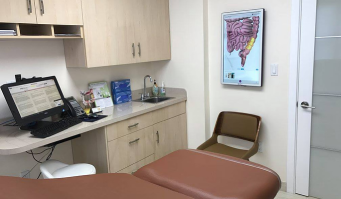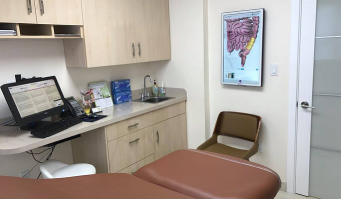IBS
- Voted Top Doctors In New York
- Award Winning, Board Certified Physicians
- Utilizing Latest Technology
What Is IBS?
Irritable Bowel Syndrome (IBS):
IBS is a chronic digestive disorder characterized by a combination of abdominal discomfort or pain and altered bowel habits. This can manifest as diarrhea, constipation, or changes in stool consistency (thin, hard, or soft and liquid). Previously, IBS was referred to by various names, including IBS colitis, mucous colitis, spastic colon, nervous colon, and spastic bowel.
Four distinct types of IBS are recognized:
- IBS with constipation (IBS-C): This subtype is primarily characterized by constipation.
- IBS with diarrhea (IBS-D): Diarrhea is the predominant symptom in this type.
- Mixed IBS (IBS-M): This type alternates between constipation and diarrhea.
- Unsubtyped IBS (IBS-U): This category applies to individuals whose symptoms don’t fit neatly into the other three subtypes.
While not life-threatening and devoid of an increased risk for other colon conditions like ulcerative colitis, Crohn’s disease, or colon cancer, IBS can be a long-term issue significantly impacting daily life. Individuals with IBS may experience increased absenteeism from work or school and feel less capable of participating in daily activities. In some cases, adjustments to work settings may be necessary, such as transitioning to remote work, modifying working hours, or even leaving the workforce entirely.
Causes of IBS?
Risk Factors for IBS:
Irritable bowel syndrome affects between 25 and 45 million Americans, with certain factors increasing susceptibility:
- Gender:
- Age
- Family history
- Emotional distress
- Food sensitivities
- Medications
- Preexisting digestive issues
Symptoms of Irritable Bowel Syndrome?
- Diarrhea
- Constipation
- Constipation alternating with diarrhea
- Belly pains or cramps
- A lot of gas or bloating
- Harder or looser stools than normal
- A belly that sticks out
- Mucus in your poop
- Feeling like you still need to poop after you just did
- Food intolerance
- Tiredness
- Anxiety
- Depression
- Heartburn and indigestion
- Headaches
- Needing to pee a lot
Diagnosis of IBS?
While no definitive laboratory tests exist for IBS diagnosis, your doctor will evaluate your symptoms against established criteria and may order specific tests to rule out other conditions, including:
- Food allergies or intolerances: This includes lactose intolerance and other concerns related to dietary habits.
- Medications: Certain medications, such as high blood pressure drugs, iron supplements, and specific antacids, may contribute to IBS-like symptoms.
- Infections: Gastrointestinal infections can sometimes mimic IBS symptoms.
- Enzyme deficiencies: Insufficient pancreatic enzyme production can impair proper digestion and lead to IBS-like symptoms.
- Inflammatory bowel diseases: These include ulcerative colitis and Crohn’s disease, requiring specific diagnostic tests.
To determine the presence of IBS, your doctor may opt for the following tests:
- Flexible sigmoidoscopy or colonoscopy: These procedures allow visualization of the intestines to identify any blockages or inflammation.
- Upper endoscopy: This is recommended if you experience heartburn or indigestion.
- X-rays: These may be used to evaluate digestive system function.
- Blood tests: These can detect anemia, thyroid issues, and signs of infection.
- Stool tests: These can identify blood or infections in your stool.
- Tests for specific conditions: These may include lactose intolerance testing, gluten allergy testing (for celiac disease), and tests to assess bowel muscle function.
Treatment of IBS?
Dietary and Lifestyle Modifications for IBS Management:
Simple changes in diet and lifestyle can often significantly improve IBS symptoms over time. Here are some helpful tips:
- Limit caffeine intake: Avoid caffeinated beverages like coffee, tea, and soda, as they can exacerbate digestive discomfort.
- Increase dietary fiber: Incorporate fiber-rich foods like fruits, vegetables, whole grains, and nuts into your diet to promote digestive regularity.
- Hydrate adequately: Aim to consume at least three to four glasses of water daily to maintain adequate hydration, which can improve bowel function.
- Smoking cessation: Abstaining from smoking has been shown to be beneficial in managing IBS symptoms.
- Stress management: Implementing relaxation techniques like regular exercise or stress reduction practices can help alleviate symptoms related to stress and anxiety, which can aggravate IBS.
- Moderate dairy intake: Limiting your consumption of milk and cheese may offer relief for some individuals with IBS.
- Smaller, more frequent meals: Opt for smaller, more frequent meals throughout the day instead of large meals, which can be more challenging to digest.
- Food journaling: Maintain a food diary to identify specific foods or dietary patterns that trigger IBS symptoms. This allows for personalized dietary adjustments for optimal symptom control

“Thank you for visiting Forest Hills Gastroenterology & Liver Disease, my goal is to treat my patients in a highly personalized manner and I am dedicated to give you the utmost attention and respect that you deserve. For more infromation on this disease or to schedule a consultation with me, please give us a call or book a tele-health appointment online.”
Albert Shalomov
Dr. Albert Shalomov, MD
Disclaimer: Educational Infromation, Not Medical Advice
It’s important to remember that the information provided here is intended for educational purposes only and should not be misconstrued as definitive medical advice. Always seek the guidance of a qualified gastroenterologist for accurate diagnosis and treatment of any specific gastrointestinal condition. Only trained healthcare professionals can provide personalized recommendations and ensure your well-being.




